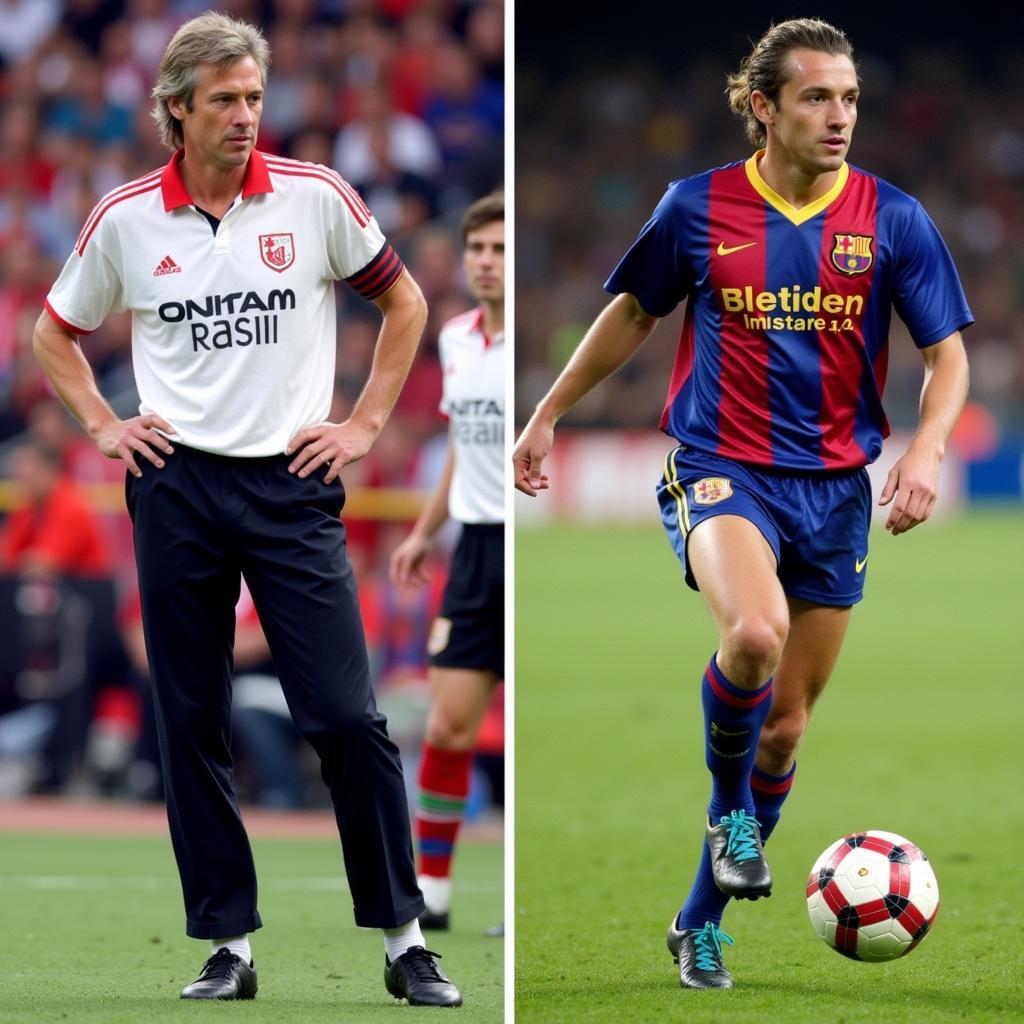The intertwined history of Ajax and Barcelona is a tale woven from the threads of shared philosophies, legendary figures, and a mutual respect that transcends the fierce rivalry on the pitch. This unique relationship, deeply rooted in the revolutionary “Total Football” philosophy, has left an indelible mark on the beautiful game.
 Johan Cruyff coaching Ajax and Barcelona
Johan Cruyff coaching Ajax and Barcelona
The Birth of a Philosophy: Rinus Michels and the Total Football Revolution
To understand the Ajax and Barcelona connection, we must first journey back to the 1960s, a period when Rinus Michels, a visionary Dutch coach, took charge of Ajax. Michels introduced a revolutionary tactical system that would later be known as “Total Football.” This fluid and dynamic approach emphasized versatility, spatial awareness, and relentless attacking, where every player was expected to contribute both offensively and defensively.
Under Michels’ guidance, Ajax blossomed, achieving unprecedented success with a team that epitomized Total Football. Players like Johan Cruyff, Johan Neeskens, and Piet Keizer became synonymous with this revolutionary style, captivating audiences with their breathtaking interplay and tactical fluidity.
Johan Cruyff: The Bridge Between Two Giants
The link between Ajax and Barcelona strengthened considerably with the arrival of Johan Cruyff, a prodigious talent who embodied the very essence of Total Football. As a player for Ajax under Michels, Cruyff’s technical brilliance, tactical acumen, and leadership qualities shone brightly. He led the Dutch giants to three consecutive European Cup triumphs (1971-1973) and cemented his place as a legend in Amsterdam.
Cruyff’s transfer to Barcelona in 1973 marked a turning point for the Catalan club. His impact was immediate and profound. He guided Barcelona to their first La Liga title in 14 years and instilled the principles of Total Football within the club’s DNA.
The Legacy of Total Football: A Lasting Bond
Cruyff’s influence extended far beyond his playing days. He returned to Barcelona in 1988, this time as head coach, and once again revolutionized the club. He built a team known as the “Dream Team,” which included Pep Guardiola, Ronald Koeman, and Hristo Stoichkov, and implemented his unique brand of attacking football. Under Cruyff’s tutelage, Barcelona claimed four consecutive La Liga titles (1991-1994) and their first European Cup in 1992, solidifying their status as a European powerhouse.
The seeds of Total Football sown by Michels and nurtured by Cruyff continue to flourish at both Ajax and Barcelona. The two clubs have consistently produced technically gifted, tactically astute players who embrace the philosophy of fluid, attacking football.
More Than Just a Philosophy: A Shared Identity
The Ajax-Barcelona connection transcends tactics and formations; it represents a shared identity, a commitment to a certain style of play that emphasizes creativity, flair, and a love for the beautiful game. Both clubs prioritize youth development, nurturing young talents in their famed academies, La Masia (Barcelona) and De Toekomst (Ajax).
This shared philosophy has led to a steady stream of talent flowing between the two clubs. Players like Patrick Kluivert, Marc Overmars, Edgar Davids, Zlatan Ibrahimović, and Luis Suarez all honed their skills at Ajax before making their mark at the Camp Nou.
A Relationship Forged in Mutual Respect
While Ajax and Barcelona have often found themselves competing for the same trophies and players, their rivalry has always been underpinned by a deep sense of mutual respect. They recognize and appreciate their shared history, their common footballing philosophy, and the indelible mark they have left on the world of football. The Ajax-Barcelona relationship is a testament to the enduring power of footballing ideals and the lasting legacy of visionaries like Rinus Michels and Johan Cruyff. It’s a relationship that continues to shape the beautiful game, inspiring generations of players and fans alike.